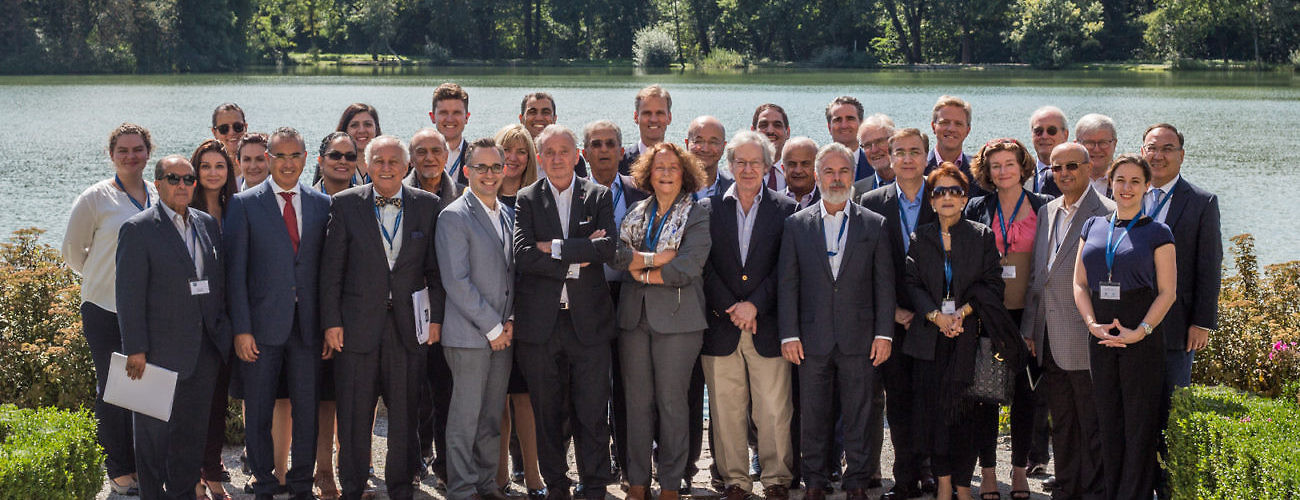From September 3–5, 2017, IPI convened its annual Salzburg Forum on the theme “Mapping the New Geopolitics, Prisoners of Geography or Lords of the Land?”
The meeting brought together former prime ministers and foreign ministers, officials from the United Nations and regional organizations, diplomats, journalists, academics, experts on the Middle East and Europe, and representatives of civil society. The setting was the Schloss Leopoldskron in Salzburg, Austria.
Among the speakers and panelists were former Prime Ministers Kevin Rudd of Australia, Mahmoud Gebril of Libya, Sid Ahmed Ghozali of Algeria, and Barham Salih of the Regional Government of Iraqi Kurdistan; former Foreign Ministers Antonio de Aguiar Patriota of Brazil, Ana Palacio of Spain, and Abubakr Qirbi of Yemen; Turki Al Faisal, chairman of the King Faisal Center for Research and Islamic Studies; Paul Bekkers, Director of the Office of the Secretary-General of the Organization for Security and Cooperation in Europe (OSCE); Snežana Samardžić-Marković, Director-General for Democracy of the Council of Europe; Udo Janz, former head of the New York office of the UN High Commissioner of Refugees; Steven Erlanger, New York Times Chief Diplomatic Correspondent for Europe, and Natalie Nougayrède, The Guardian Foreign Affairs Commentator.
Speaking for IPI were its President, Terje Rød–Larsen; Vice President, Adam Lupel, and Senior Adviser, Nasra Hassan.
The two-day gathering included an introductory working dinner and three discussion sessions entitled “Mapping the New Geopolitics- Europe: Russia, Brexit, and the Future of the European Union” and “Changing Relations in the Middle East and North Africa: What Comes Next?” A closed fourth session charted progress in the operations of a Task Force for Regional Cooperation in the Middle East. The meeting was conducted under the Chatham House rule of non-attribution.
Of concern to many speakers was the future of multilateralism in a world that UN Secretary-General António Guterres has described as one of “disorganized multipolarity.”
Participants cited the diminished interest in multilateral cooperation by the United States as cause for worrying about the future of the multilateral system without an agreed upon leader and any sense of universal rules. It was argued that we are now in a more transactional world, one that introduces national and regional rivalries into the search for universal solutions. One speaker remarked that large states will increasingly go outside the multilateral system because less structure benefits them while more structure is seen as limiting them.
There was an emphasis on the current state of disrepair in international institutions at a time when states are reclaiming sovereignty from those institutions and leaving them weakened. Social media has greatly amplified the influence of national lawmakers seeking to influence international policy.
It was argued that strengthening regional and global institutions is necessary to forestall a drift into disorder and even chaos in the global trading system. Participants cited the inability of individual nations to tackle such problems as climate change and decried the unwillingness of the great powers to plug the gap.
Speakers in the session on Europe noted that despite the tremendous economic benefits of membership in the European Union, support for the EU at the national level is seen as a political liability. National leaders frequently find it easy to “blame Brussels” for their own failures. At the same time, they acknowledged that populism takes root best when a large number of citizens feel themselves deprived of opportunities.
The discussion on Europe focused on the fact that while migration remains an opportunity for Europe, it is widely viewed as a threat to Europe. One speaker noted that terrorism was mostly home grown but the perception is that it is caused by migrants. There also is continuing confusion for the public, in the media and among policy makers on the difference between migrants and refugees.
The conversation on the Middle East stressed the centrality of Iraq to any regional solution because of the involvement of all the powers vying for influence in the area.
Related Coverage:
IPI Joins Forces with The Council of Europe








